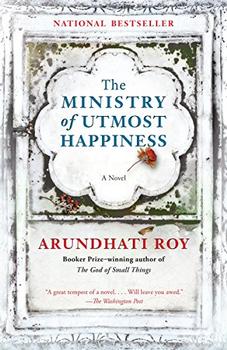Summary | Excerpt | Reading Guide | Reviews | Beyond the Book | Readalikes | Genres & Themes | Author Bio

Excerpt
The Ministry of Utmost Happiness
She was the fourth of five children, born on a cold January night, by lamplight (power cut), in Shahjahanabad, the walled city of Delhi. Ahlam Baji, the midwife who delivered her and put her in her mother's arms wrapped in two shawls, said, "It's a boy." Given the circumstances, her error was understandable.
A month into her first pregnancy Jahanara Begum and her husband decided that if their baby was a boy they would name him Aftab. Their first three children were girls. They had been waiting for their Aftab for six years. The night he was born was the happiest of Jahanara Begum's life.
The next morning, when the sun was up and the room nice and warm, she unswaddled little Aftab. She explored his tiny body—eyes nose head neck armpits fingers toes—with sated, unhurried delight. That was when she discovered, nestling underneath his boy-parts, a small, unformed, but undoubtedly girl-part.
Is it possible for a mother to be terrified of her own baby? Jahanara Begum was. Her first reaction was to feel her heart constrict and her bones turn to ash. Her second reaction was to take another look to make sure she was not mistaken. Her third reaction was to recoil from what she had created while her bowels convulsed and a thin stream of shit ran down her legs. Her fourth reaction was to contemplate killing herself and her child. Her fifth reaction was to pick her baby up and hold him close while she fell through a crack between the world she knew and worlds she did not know existed. There, in the abyss, spinning through the darkness, everything she had been sure of until then, every single thing, from the smallest to the biggest, ceased to make sense to her. In Urdu, the only language she knew, all things, not just living things but all things—carpets, clothes, books, pens, musical instruments—had a gender. Everything was either masculine or feminine, man or woman. Everything except her baby. Yes of course she knew there was a word for those like him—Hijra. Two words actually, Hijra and Kinnar. But two words do not make a language.
Was it possible to live outside language? Naturally this question did not address itself to her in words, or as a single lucid sentence. It addressed itself to her as a soundless, embryonic howl.
Excerpted from The Ministry of Utmost Happiness by Arundhati Roy. Copyright © 2017 by Arundhati Roy. All rights reserved. No part of this excerpt may be reproduced or reprinted without permission in writing from the publisher.
Use what talents you possess: The woods would be very silent if no birds sang there except those that sang best
Click Here to find out who said this, as well as discovering other famous literary quotes!
Your guide toexceptional books
BookBrowse seeks out and recommends the best in contemporary fiction and nonfiction—books that not only engage and entertain but also deepen our understanding of ourselves and the world around us.